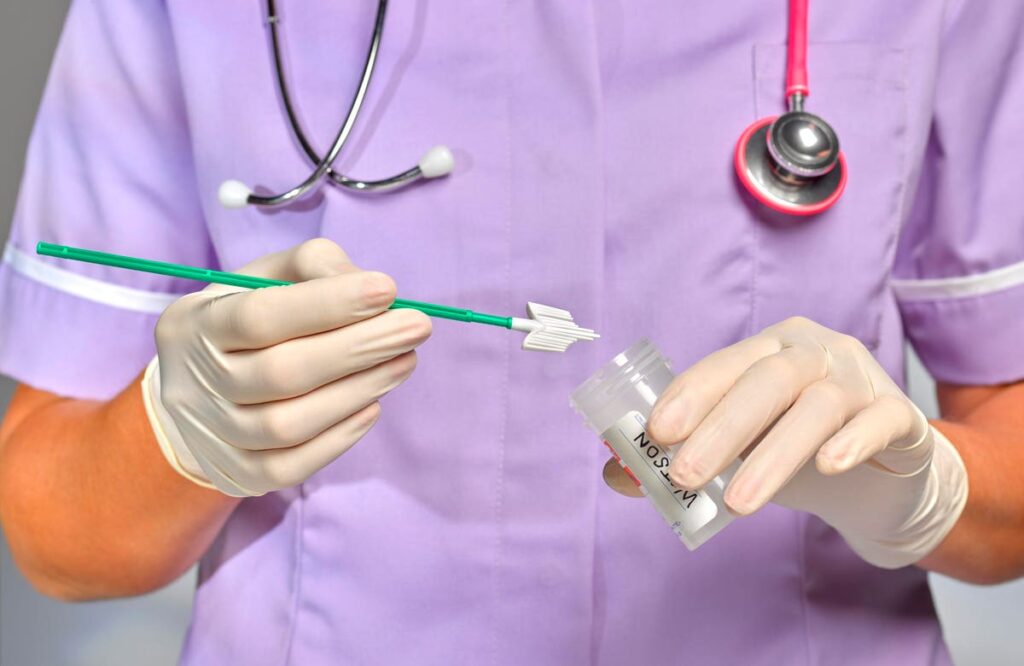Clinician performs a cervical smear test
Some 17,500 women in Northern Ireland will have their Pap smears re-checked after a highly critical report found serious failures over 13 years at a testing laboratory.
Some women will need to come in for a new test, health leaders said in a statement, but most will have their existing slides re-examined over a period of several months.
There isn’t the lab capacity to re-test all women potentially affected by the poor performance, and Northern Ireland’s cervical screening programme is also already facing a significant backlog.
Pap smears are considered critical public health interventions as they can help spot early warning signs of potentially deadly cervical cancer.
Although most “negative” results issued by the lab will have been correct, some samples tested during this period would likely be considered “abnormal” by other U.K. labs.
It’s thought that only a small proportion of the many thousands of women checked by the lab will actually have been given an inaccurate result. But some may not have had a new test performed in the meantime.
The women were screened through the Southern Health and Social Care trust: a public organisation that runs health services for around 390,000 people in the south of Northern Ireland.
Southern called in the U.K.’s Royal College of Pathologists after staff blew the whistle on long-standing problems at the lab last summer.
The College’s investigators found evidence of numerous failures dating from 2008 to 2021, including “significantly” poor staff performance that wasn’t properly monitored or corrected.
Cervical smear tests—called “Pap smears” in the U.S.—look for abnormal cells that could be indicative of cancer. The tests themselves cannot diagnose cancer.
An alternative testing process, whereby staff look for HPV (human papillomavirus) before checking samples for abnormal cells, has been rolled out across the rest of the U.K. in a bid to make testing more sensitive and efficient.
HPV itself is very common and is rarely a cause for concern. Most types don’t cause any symptoms and clear up by themselves, as the Centers for Disease Control and Prevention notes. But certain types of HPV increase a person’s risk of developing cervical cancer, which can be deadly.
Testing for HPV first allows lab staff to check the cells of women with the virus before checking other samples. Almost everyone who develops cervical cancer has one of these high risk types of HPV, according to the charity Cancer Research UK, so primary testing can help speed up the detection of warning signs.
Health leaders hope this testing method will help Northern Ireland reduce its significant cervical screening backlog once it’s introduced across the country this December.
Royal College reviewers said finalising this national switch would be the most effective way of helping women who’d been inadequately screened by Southern, given the capacity issues facing its labs and others in the U.K.
Traditional pap smears, primary HPV testing and HPV “co-testing”—where labs look for HPV at the same time as abnormal cells—are available in the U.S. The CDC recommends members of the public speak to a doctor about which tests are right for them.
Northern Ireland’s Department of Health called the results of the Royal College report “clearly unacceptable” in a statement, and said that a “new era for the cervical screening” would begin once primary HPV testing was available.
Southern’s medical director, Dr Stephen Austin, apologised for the lab failures and said the organisation was “very conscious of the anxiety” the report would cause women in the area.
He said the trust was writing to all women involved and setting up a phone line for anyone with concerns. He added Southern was fully implementing several recommendations listed in the report.
Dr Joanne McClean, director of public health at Northern Ireland’s Public Health Agency said women should continue to attend screening appointments as normal: “Cervical screening has proven to be very effective at detecting early abnormalities which, when treated, can prevent cancer and save lives. It will continue to do so if those who are eligible attend for screening when invited.”
She said it was important for anyone worried about symptoms like abnormal bleeding, or pain or discomfort in the lower pelvis to contact their doctor, regardless of their testing history.
“A cancer could also develop between screening tests,” she added. “There is a small chance that the test misses some changes to your cervix.”


